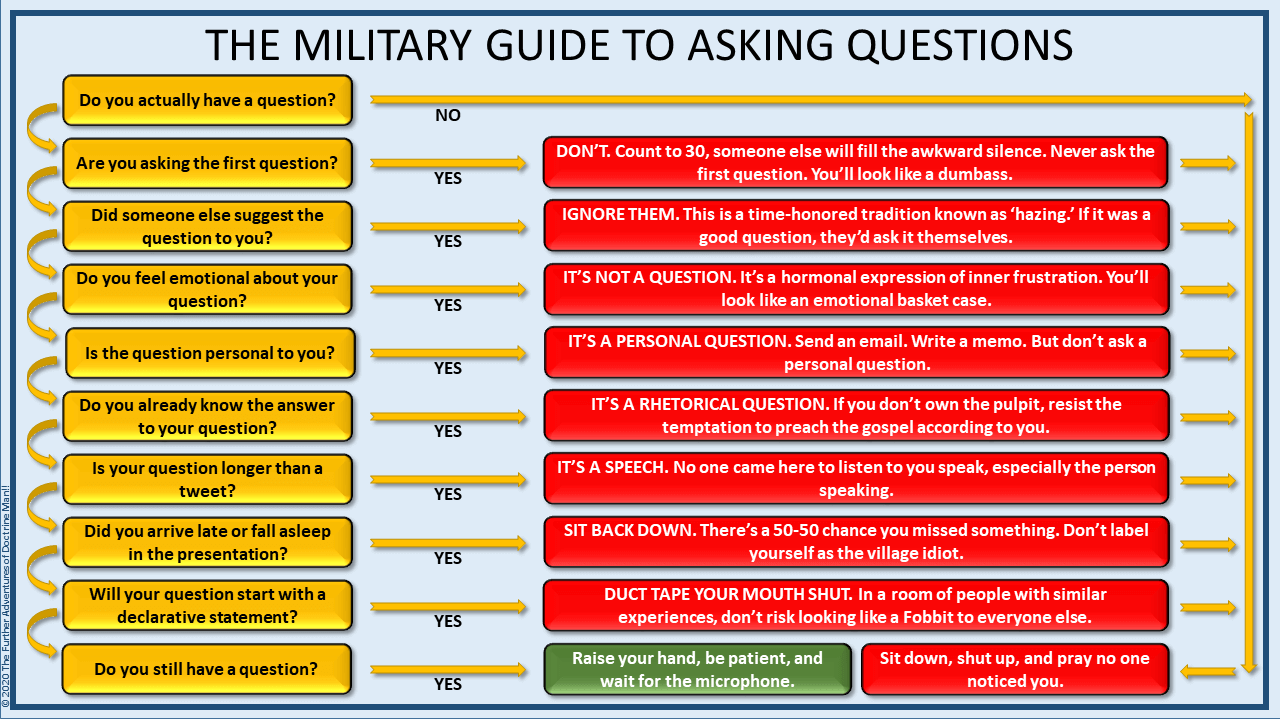“If there are no stupid questions, then what kind of questions do stupid people ask? Do they get smart just in time to ask questions?” – Scott Adams
We’ve all been there. Maybe you’re in an auditorium of your peers. Maybe you’re in a crowded conference room. Or maybe you’re sitting in a classroom somewhere. The locale might change, but the situation never does. It’s as inevitable as the gastro-intestinal reaction to MRE chili mac. Someone is going to ask a question.
It’s hot, you’re uncomfortable, and you can feel the sweat beading up on your back. You’ve been sitting for the better part of an hour, your feet are stiff, and your underwear has occupied an inconvenient battle position. All you want to do is get up and leave. But you can’t. The person speaking is wrapping up, then pauses to query the audience for questions. Like most people in the room, you silently pray that no one will raise a hand. But, inevitably, someone does. A quiet groan spreads across the collected masses like the wave at a college football game.
Consider your options before raising your hand
There are more than a few good reasons to ask a question in this type of forum, and just as many reasons you might want to consider your options carefully before doing so. Whether you should is a dilemma many of us have faced. Fortunately, there’s an app for that. Well, sort of. It’s actually more of a guide, scribbled in the back pages of a green notebook over the course of more meetings than I dare to remember.
- Do you actually have a question? If yes, continue to Step 2. If no, then sit down, shut up, and pray that no one noticed you.
- Are you asking the first question? If yes, don’t. Count to 30. Someone else will fill the awkward silence. Never ask the first question. It’s a trap. If no, then continue to Step 3.
- Did someone else suggest the question to you? If yes, ignore them. This is a time-honored tradition known as “hazing.” If it was a good question, they’d ask it themselves. If no, then… well, you know what to do.
- Do you feel emotional about your question? If yes, it’s not a question. It’s a hormonal expression of inner frustration. If you ask the question, everyone in the room will look at you like you’re an escaped mental patient. If no, you know the drill. Keep going.
- Is the question personal to you? If yes, it’s a… personal question. Instead, send an email. Write a memo. But don’t ask a personal question. If no, move out smartly to Step 6.
- Do you already know the answer to your question? If yes, it’s called a “rhetorical question”. If you don’t own the pulpit, resist the temptation to preach the gospel according to you. If no… yeah, you know what to do.
- Is your question longer than a tweet? If yes, it’s a speech. No one came here to listen to you speak, especially the person speaking. If no, keep on moving down the list.
- Did you arrive late or fall asleep at any point? If yes, sit back down. There’s a 50-50 chance you missed something. Don’t feel obligated to assume the role of the village idiot. There are other people more than willing to do that for you. If no, Step 8 is waiting for you.
- Will your question start with a declarative statement (e.g., “When I was in…”)? If yes, duct tape your mouth shut. In a room full of people who all share similar experiences, don’t risk looking like a Fobbit to everyone else. If no… you’re almost home.
- Do you still have a question? If no, then just take your seat quietly and pretend you were stretching. If yes, then raise your hand, be patient, and wait to be recognized so you can ask your question.
Don’t Contribute to the list of stupid questions in life
Whoever said, “There are no stupid questions,” clearly never got out much. There are stupid questions. They’re everywhere. Spend enough time in crowded conference rooms, auditoriums, and the occasional classroom, and you’ll hear enough to create a long list of them. At no time should you feel obligated to contribute to that list.





